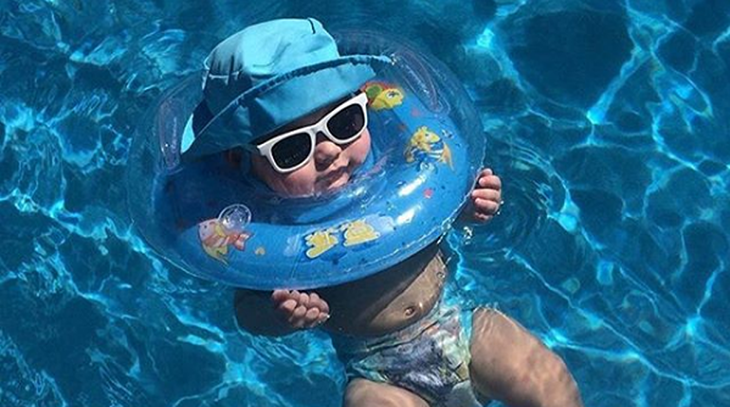
What exactly are neck floats? For those with babies, these are common swim staples. For those who are unfamiliar with it, these are inflatable plastic rings that are designed to cradle the head of the child while he or she floats on water.
While parents get neck floats for safety purposes, statistics show that there is 1 death and 1 hospitalization that have been brought about by these floating aids.
There was a safety communication that was issued last June 28 by the U.S. Food and Drug Administration (FDA). They had sent out a warning to parents, caregivers, and healthcare providers about these neck floats. They sad that these should not be used on babies for water therapy interventions. This becomes especially crucial for infants who have developmental delays or special needs. Included on the list are spina bifida, spinal muscular atrophy (SMA) type 1, Down syndrome, and cerebral palsy.
Reports showed that one baby had already died from this. Another one was also hospitalized after acquiring injuries that were related to the use of neck floats. Both reports showed that the person in charge was not directly monitoring the baby, according to the statement made. The agency was also open to the possibility that some cases may not have been reported.
All about Neck Floats
In gist, neck floats are inflatable plastic rings meant to be used by infants when they’re in water. These can be placed the neck in order to hold the head up while the baby floats. There are brands of floats out there specifically marketed for infants as young as 2 weeks old. There are also manufacturers claiming that their products cater to babies with conditions like spina bifida, spinal muscular atrophy (SMA) type 1, Down syndrome, cerebral palsy, or traumatic brain injury (TBI). Then there are those that promote their products as a tool that can be utilized by therapists particularly when doing water therapy. Parents have also been known to use these during bathing time and while their baby is in the pool or ocean.
Zero Data on the Benefits of Neck Floats
“There is no data to support these neck floaties. So I think that is the most important piece for parents to know,” said Sarah Denny, MD. She is a pediatrician at Nationwide Childrens Hospital in Columbus, Ohio. She is also a spokesperson for the AAP. This was her statement in an interview she made with ABC News.
“The other thing is, when it comes to water safety, nothing inflatable is considered a water safety tool. We have personal flotation devices and U.S. Coast Guard–approved life jackets that we can recommend. But none of those would be something that a child would put around their neck.”
“The FDA came out with their warning and we don’t as an academy speak against specific items. But from a safety standpoint, I would encourage parents to not use these items,” Denny also added.
Neck Floats Don’t Fully Protect Infants from Drowning or Neck Injuries
There are several risks involved when it comes to using baby neck floats. These include death due to drowning and suffocation, and strain and injury to a baby’s neck. This was according to the FDA. Babies who have been diagnosed with special needs like spina bifida or SMA type 1 may be at increased risk for serious injury.
“The use of neck floats in babies with special needs can lead to increased risk of neck strain and injury,” the FDA said when they were asked to give a recommendation to parents and caregivers.
While it’s generally believed that death or serious injury brought about by neck floats is rare, everyone, especially healthcare providers, parents, and caregivers should be made aware of the facts because they do happen, said the agency.
Experts Do Not Encourage Using Floats of Any Kind
The American Academy of Pediatrics has given swim tips to those who need education. They do not advice the use of swimming aids such as floaties. According to them, these inflatables shouldn’t be treated as a substitute for approved life jackets. The thought often gives parents a false sense of security. Yet, reality has proven otherwise.
The organization recommends something else. They basically said that children should never be left alone in or near a pool. Someone needs to keep an eye on them at all times. There needs to be close adult supervision. There is no better way to avoid injuries or drowning. And whenever children 5 years old or younger are in or around water, an adult must be nearby. It’s also recommended that the adult be trained to swim and perform CPR.



